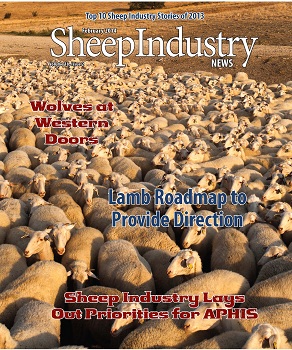
- February 2014
- President’s Notes
- Market Report
- American Lamb Industry Announces Final Roadmap
- Looking Back: Top 10 Sheep Stories of 2013
- Sheep to Shawl
- Sheep Growing Senator Weighs in on Idaho Wolf Debate
- Are Your Ewes Pregnant?
- Economist Sees Bumpy Years for U.S. Ag
- New Farm Bill May Bring Insurance Issues
- New Wool Yarn Mill Filling Niche
- College Wool Judging Teams Pick Up Skills Together at Belle Fourche Clinic
- ASI Offers Sheep Priorities to APHIS
- Utah Farm Bureau: States Can Manage Wolves
- Farmland Prices Rise, But How Long is Ride?
- Sheep Heritage Contributors
- Obituaries
New Wool Yarn Mill Filling Niche
Minnesota Operation to Feature Wool Produced in the United States
RYAN BAKKEN
Forum News Service
Stephenie Anderson’s timing for starting a wool-processing plant in northwest Minnesota is spot-on. So says Bill Batchelder, president of Bemidji Woolen Mills in Bemidji, Minn., and Jim Stordahl, an extension agent in Polk County.
“There’s a renaissance nationwide of returning to products made in America,” Batchelder said. “There’s a large niche of consumers who are demanding natural fibers and American-made products, not ones made overseas.”
Stordahl agrees: “She’s part of a changing landscape, a movement where some of this (clothing) will be made back here.” Anderson, a 45-year-old who grew up in Fertile, Minn., started her Northern Woolen Mills plant three months ago. With eight employees, the business won’t have a big economic impact on this Polk County town of 1,500. However, it’s enough of a jolt that the city gave the fledgling business three acres of land in its industrial park on its western edge and a low-interest $100,000 loan.
The plant’s processing starts with raw wool from sheared sheep and bison — mud, snarls and all — and turns it into fine, woolen yarn that is sold to clothing makers such as Bemidji Woolen Mills. Anderson’s career track, which included management, tourism marketing and clothing design, took a dramatic turn after her employer had her lobby Bemidji Woolen Mills to resume the manufacturing of wool yarn. The company wasn’t interested, so Anderson filled the niche. “I saw a need, an opening in the market, and decided to fill it myself,” she said. “Opportunity knocked and I went for it.”
Ironically, her first customer was Bemidji Woolen Mills. The wool is all USA-grown, including from sheep ranchers in Fosston, Goodridge and McIntosh, Minn., and a bison producer in New Rockford, N.D. The equipment also can handle llama and alpaca wool. Northern Woolen Mills will produce 100 pounds of yarn per day, making it the second-largest processor in the country.
“I used to work in high heels and with (polished) fingernails,” she said. “Now I have grease on my hands and no fingernails. But it’s a lot more fun.”
Stordahl said the endeavor can have an impact at several levels. “It’s certainly not a new 3M in the neighborhood and, for the average rancher, wool is a minor part of production,” he said. “But it does fill a niche. And wool has become a high-end fabric. Fosston’s city administrator, expressed excitement at a new business that didn’t seem likely even a few years ago.
“Any small industry we can get, whether it’s eight jobs or 50 jobs, is a good deal for us,” he said. “Who would have thought wool processing would come back?”

